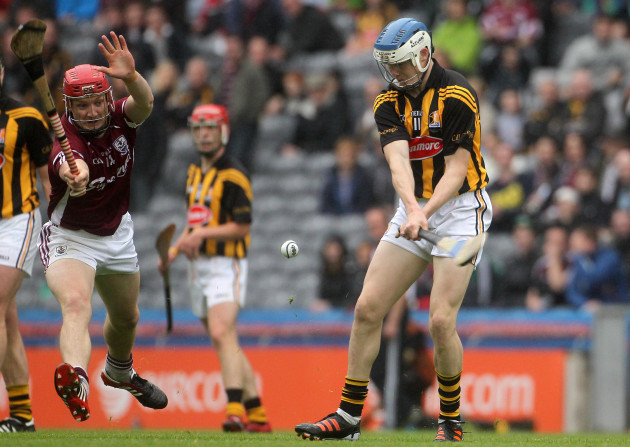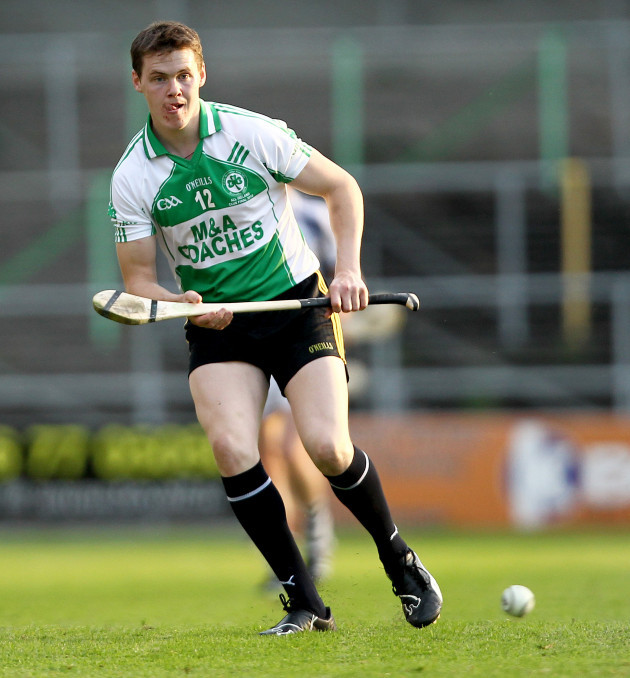I
IN A HURLING pod debate about the superiority of TJ Reid or Joe Canning last week, the former Kilkenny hurler Paul Murphy – in Reid’s corner, understandably – was inspired by James Skehill’s innovative case for Canning to highlight a lesser known quality of Reid’s.
“TJ’s better at commentating on himself than Joe,” he said, leaving Skehill and the show’s host Will O’Callaghan slightly uncertain of what was to come. As Murphy went on to recall evenings training with Kilkenny, he revealed what would occur as Reid made his way out onto the pitch.
“TJ would come out with the socks up around the knees,” he explained, “and as he’s coming out [he’d say], ‘And the crowd roars, TJ Reid is on the pitch,’ and he’d rise [the sliotar] up, ‘and he sticks it over the bar.’ He’d be just talking to himself, and it’s hilarious . . . It would even get a laugh out of Cody.”
Although the argument did not do much to sway Skehill’s preference for his former Galway teammate Canning, it alerted the rest of us to a sense of playfulness in Reid that was not widely known.
“He’d be going on saying, ‘and he pops it off to Eddie Keher’ – just making up stuff,” continued Murphy, the decades separating one modern legend from an icon of an earlier age no barrier to Reid’s imagination.
It is typical Kilkenny behaviour, in a sense, characteristic of an attitude Brian Cody codified. Everything has been won for club and county, but Reid’s desire for success transcends the corporeal and even in training he is winning All-Irelands with Keher in the 1970s.
And at the same time it is indicative of the possibilities Reid singularly foresees in the act of play. Perhaps Keher occasionally pops the ball off to him in these scenarios, but in this instance it is Reid who is making things happen. For the greater part of his inter-county career, Reid’s ability to execute what most players cannot see has been trusted to make things happen for Kilkenny.
Therein lies a contradiction which allows us to better understand TJ Reid.
II
It is difficult to adequately praise Reid.
He has been central to the winning of multiple All-Irelands for club and county, claimed all the individual awards and, injuries notwithstanding, will probably finish his inter-county career with hurling’s all-time scoring record.
What’s more, as a star hurler of the social media age, Reid’s performances are captured and shared with a reliability that allows even the most passive observers to appreciate his genius. As Reid’s former Kilkenny teammate David Herity explains to The 42: “TJ’s ability to execute every skill of the game is absolutely unrivalled.
“I remember him being about 30 yards out in Nowlan Park one time,” Herity continues, stood as he was in one of the goals during a training match. “He just put this top spin on the ball and it flew into the top corner. I didn’t move.
“He would do these things and people would just be laughing about it after training. ‘What the hell was that?’ Insofar as, who else would even think about that? He sees a goal opportunity everywhere and anywhere in what he’s doing.”
In the same sense then that new studies of Bob Dylan’s life and work keep appearing, often without contributing anything worthwhile, it is perhaps easier to allow the grandeur of Reid’s work speak for itself.
III
Play is not “ordinary” or “real” life. It is rather a stepping out of “real” life into a temporary sphere of activity with a disposition all of its own. Every child knows perfectly well that he is “only pretending”, or that it was “only for fun”… This “only pretending” quality of play betrays a consciousness of the inferiority of play compared with “seriousness”, a feeling that seems to be something as primary as play itself. Nevertheless, as we have already pointed out, the consciousness of play being “only a pretend” does not by any means prevent it from proceeding with the utmost seriousness, with an absorption, a devotion that passes into rapture and, temporarily at least, completely abolishes that troublesome “only” feeling . . . The contrast between play and seriousness is always fluid. The inferiority of play is continually being offset by the corresponding superiority of its seriousness.
-
Johan Huizinga, Homo Ludens
IV
TJ Reid is not shy about entering the discourse himself, however.
“He used to compliment himself in training sessions when he scored,” the All-Ireland winning Kilkenny captain Michael Fennelly tells The 42, adding another layer to Murphy’s revelation. “He’s not the norm, but we all got a good kick [out] of that.”
Nobody has yet documented whether Reid carries such behaviour over into matches (it’s doubtful, obviously), but given the hectic nature of Kilkenny’s training sessions in the Cody era, at least, Reid clearly has little trouble balancing the twin expectations of seriousness and unseriousness when it comes to the prospect of play.
“Other people would be worried that people are listening to them,” reasons Herity, “but he doesn’t think about that, he’s just in the moment. ‘I’m going to get the ball and I see a goal is on, OK, I’m going to go for goal.’ His approach to hurling is so beautifully simplistic and that’s what makes him great.”
Indeed, one might argue that Reid’s ability to make deeply serious moments appear almost routine enhances his effectiveness in the moments of greatest jeopardy.
As recently as last Sunday, it had seemed a touch more than hopeful of Ger Canning to suggest on RTÉ’s coverage of the Leinster hurling final that all Kilkenny needed was a goal to steal a win away from Galway. Two points down with seconds remaining and no clear avenue to the Galway goal in sight, there was no real sense that it was a live possibility.
After a looped pass into Reid’s path broke, he immediately put pressure on Sean Linnane to ensure that Galway did not get an easy clearance away. Quickly joined in his efforts by Mikey Butler, Cian Kenny and John Donnelly, both sides tried desperately to get the ball to hand to no great avail. After a few seconds of panic, it was Donnelly that finally managed to strike the sliotar back in front of the Galway goal. Fortune favoured Kilkenny’s efforts and Cillian Buckley proceeded to score the game’s winning goal.
Now, Reid was not alone in his efforts, of course. But the 35-year-old with 0-9 (6f) to his name on the day kicked things off by initially stifling Linnane. At the decisive moment in a game that was all but over, he made the correct decision. There was a touch of luck in what followed (what were the odds of Padraic Mannion’s kicked clearance going right into Buckley’s hand?), but luck would have had no room to exert an influence on things if not for Reid’s initial doggedness.
Fennelly cannot recall a time when he witnessed Reid undone by an occasion. Herity concurs.
“How many times has he been that clutch player who nailed a free, nailed a goal at that vital stage of a game,” he says. “You can name out as many other great hurlers as you want, but in terms of mentality there is no one like TJ Reid.”
V
He is part of a lineage, however. Reid back to Henry Shefflin, DJ Carey, Eddie Keher and more besides. The best hurler for the country’s most successful county. And yet, Reid has traced a singular path in this role: a seven-time All-Ireland winner by the age of 27 (albeit a marginal figure for the first few), he has burnished his reputation as perhaps Kilkenny’s greatest ever toiling in the wilderness of a relative All-Ireland drought.
Keher, Carey or Shefflin never went close to seven years without lifting the Liam MacCarthy Cup (eight if Kilkenny do not win this year’s championship), but it has rarely ever negatively influenced our assessment of Reid whose last All-Ireland win came in 2015.
In a county where All-Ireland success is expected, Shefflin and his 10 All-Ireland medals is a measure of the most successful era in Kilkenny hurling. Reid, on the other hand, has distinguished himself by never allowing Kilkenny to fall too far from the idealised understanding of itself when that great era ultimately came to an end.
In this regard, he stands apart somewhat. It is not a role that Kilkenny’s best hurler is used to playing in any generation. Yet, Reid has thrived under the pressure of years passing by with no All-Ireland win to break this unwanted streak.
To understand his perseverance, one is best served looking at his approach to play.
Deadly serious in his preparation (as is most obvious in his physical conditioning at 35), Paul Murphy highlighted in that same Hurling Pod discussion how much enjoyment Reid takes from simply playing the game. “He is playful when he’s playing the game . . . It’s a game for him and he’s still playing it for the enjoyment,” explained Murphy.
Perhaps it is that he amassed so many All-Ireland medals as quickly as he did, or continued to enjoy national success with Ballyhale Shamrocks in the years Kilkenny’s powers waned, but Reid has never appeared deterred during the lean times. The testimony of former teammates would suggest that he has always managed to find joy amid the struggle.
“The consciousness of play being ‘only a pretend’ does not by any means prevent it from proceeding with the utmost seriousness,” argued Huizinga in his seminal work on the importance of play for humanity. “The contrast between play and seriousness is always fluid.”
Reid embodies this contrast. The one man who can conceivably engineer Kilkenny’s way out of their relative wilderness, he retains the timeless enthusiasm of a boy whose imagination might yet wrench reality from his dreams of more success.



